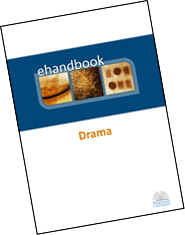eHandbook: Drama
Brian McGuire
- Ideal for KS3, GCSE and beyond
- Defines over 40 drama techniques
- Convenient digital format
A hands-on approach
Most drama materials written for students concentrate on the background of theatre and give little space to explaining how students can start devising and performing for themselves. The eHandbook: Drama is different. It concentrates on defining the techniques used in improvisational drama, enabling students to develop a clear understanding of how drama is used and giving them more confidence with their practical and written work.
A wealth of material
The eHandbook: Drama covers over 40 drama techniques including hotseating, role-play, forum theatre and many more. Each technique is accompanied by a lively cartoon and explained in clear, accessible text that is suitable for all ages and abilities.
The perfect course companion
In addition, the eHandbook: Drama also covers technical aspects of theatre such as lighting and sound, and has a section on writing about drama and evaluating performances. It makes an ideal companion to any drama course, from Year 7 right up to GCSE and beyond.
At last, your students will have access to a clear understanding of how drama is used in today’s schools – quite simply this is a book that will raise standards of attainment.
Accessible to all
The eHandbook: Drama can be shared across your school network and printed out as required. Priced at less than £1 per student, it also makes an extremely cost-effective addition to your department’s resources.
By the same author:
Note that this product is also available as part of the Digital Library for Drama KS3.
Contents
Introduction
The Drama process
- The content
- Drama skills and techniques
- Personal and social skills
Drama techniques
- Basic role-play techniques
- Role-play
- Preparing for the role
- Sustaining the role
- Developing the role
- Language of the role
- Role-reversal
- Role within a role
- Writing in role
- Secret role-play
- Role-on-the-wall
- Mantle of the expert
- Teacher in role
- Basic improvisation techniques
- Freeze-frame
- Bringing to life
- Spotlighting
- Focus in
- Marking the moment
- Hotseating
- Interviewing
- Thought in the head
- Thought tunnel
- Giving witness/making point of view
- Good angel/bad angel
- His/her thoughts
- Re-enactment
- Forum theatre
- How close?
- Framing
- Caption making
- Fixing space
- Solo thinking
- Presentation skills
- Thinking time
- Improvisation/prepared improvisation
- Workshop presentation
- Mime
- Sequencing
- Voice patterns
- Addressing the audience
- Narrating
- Soliloquy
- Dramatic pause
- Blocking in
- Facing out of the drama
- Turning through the audience
- Slow motion
- Symbolism
- Sound collage
- Amplifying
- Split staging
- Docudrama
- In the round
- Drama techniques checklist
- Expectations at Key Stage 3
Developing an Improvisation
- Selecting a theme
- Exploring a theme
- Choosing a group
- Focus and title
- Initial development of content
- Shaping and character development
- Developing the structure
- Getting the best from your voice
- Costumes/key props
- Setting moods and establishing place
- Positions, sightliness and levels
- Rehearsals and performance
- Preparing a dramatic piece for examination
- Forms and examples
- Themes
- Examination requirements
- Focus
- Synopsis sheet: example
- Synopsis sheet
- Character description
- Character notes
- Character information to research
- Character summary
- Character details: example
- Character details
- Dramatic highlights
- Getting the best from your voice: Example
- Getting the best from your voice
- Cue sheet: sound
- Cue sheet: lights
- Notes on the dramatic piece: example
- Notes on the dramatic piece
- Rehearsed presentation
- Audience reaction: example
- Audience reaction
Producing written work
- Writing about improvisation
- Writing about your prepared presentation
- Writing appraisals/reviews
- Forms and examples
- Notes for written work: example
- Notes for written work
- Key Stage 3
- Key Stage 4
- Appraisal immediate thoughts: example
- Appraisal immediate thoughts
- Performances seen
Appendix
- Useful words
About the author
Brian McGuire is a deputy headteacher at Bedford High School in Leigh, Lancashire. He has a great deal of experience as an Arts/Drama consultant and as a senior examiner for Drama. He is recognised as one of the country’s leading authorities on Drama.
Price details
- £50 for 50 licences.
- Additional licences 75p each.
Get in touch
For more information, please call 01223 350555 or email info@pearson.co.uk.



